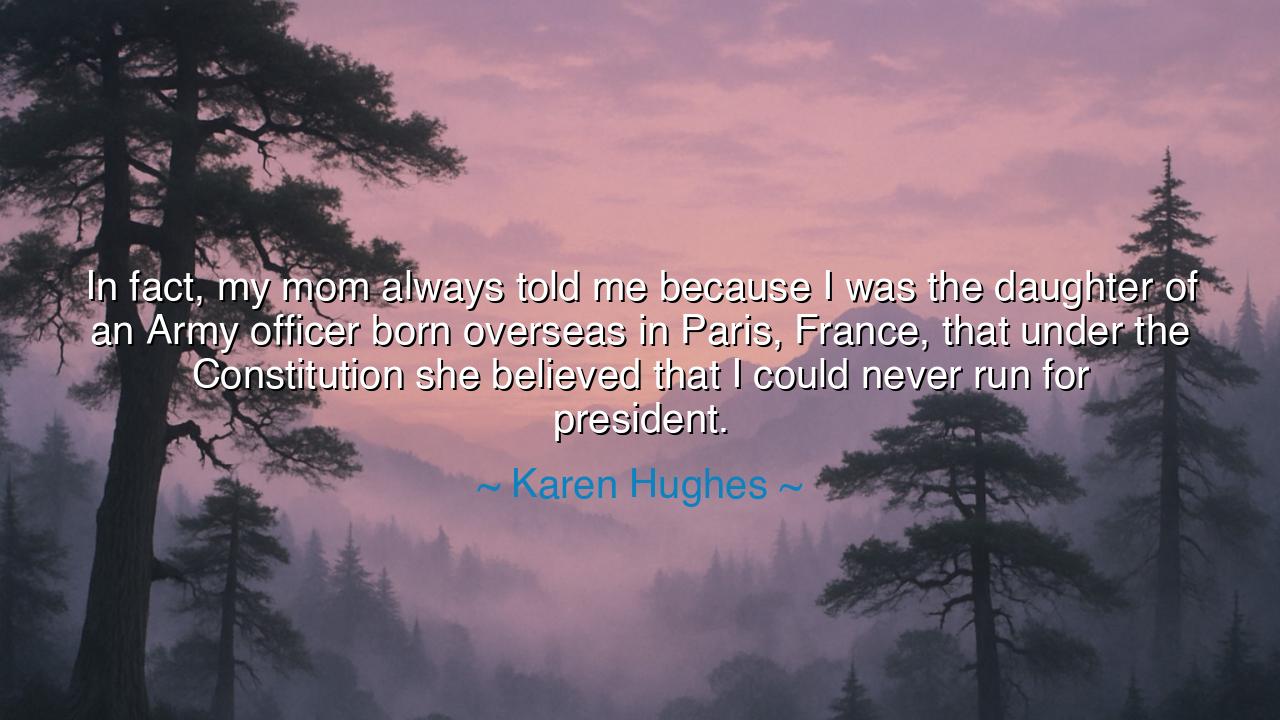
In fact, my mom always told me because I was the daughter of an
In fact, my mom always told me because I was the daughter of an Army officer born overseas in Paris, France, that under the Constitution she believed that I could never run for president.






Hear, O seekers of understanding, the words of Karen Hughes, who spoke with remembrance of her mother’s caution: “In fact, my mom always told me because I was the daughter of an Army officer born overseas in Paris, France, that under the Constitution she believed that I could never run for president.” What may seem at first a matter of law and circumstance carries within it a greater reflection on belonging, identity, and the limitations we imagine for ourselves.
Let us begin with the foundation: she was the daughter of an Army officer. This detail is not merely a fact of lineage, but a symbol of service. Her life began within the orbit of duty, her father stationed abroad in the service of his nation. Already we see the paradox: though her roots were tied to the soil of America through her father’s oath, her birth in Paris set her apart, creating questions of legitimacy in the eyes of law and custom. Thus her life began with both belonging and exclusion entwined.
Her mother’s teaching—that she could never be president—was not meant as cruelty, but as protection. Parents often speak warnings to prepare their children for a world of limitations. The Constitution, revered and ancient, contains the clause that only a “natural-born citizen” may ascend to the nation’s highest office. And though Hughes was indeed a citizen by birth through her father, her mother’s understanding of the law created in the child’s heart a shadow, the belief that the door of ultimate leadership was closed. Thus, even before she dreamed of greatness, she was told where her dreams must end.
This echoes through history. Consider the story of Alexander Hamilton, born in the West Indies, who rose to become one of the Founding Fathers of America. Brilliant in mind and fierce in spirit, he helped build the financial system of the United States, yet by birth outside the land, he was barred from ever seeking the presidency. His life, like Hughes’s reflection, shows how circumstance can limit even the most capable, shaping destinies by the accident of birthplace.
Yet herein lies the deeper lesson: many of the barriers we face are not of stone, but of belief. Hughes herself did not become president, but she rose to great influence as an advisor, counselor, and voice of wisdom in halls of power. Her mother’s words may have framed the limits of one path, but they did not prevent her from shaping history in other ways. So too it is for us: though one road may be closed, countless others remain, and it is upon those that destiny often unfolds.
The meaning, then, is not simply about the presidency, nor about birthplace, but about how we reckon with the tension between law, circumstance, and personal ambition. We may be born into conditions that seem to limit us. We may be told that certain doors are shut. Yet within us lies the power to choose other doors, to create other legacies, to serve in other ways.
And so, my counsel to you is this: do not allow the shadows of limitation to silence your striving. Honor the warnings of your elders, but do not let them define the horizon of your spirit. If one path is denied, forge another. If one dream seems beyond reach, discover the dream that lies waiting in another field. For greatness is not found only in thrones and titles, but in the courage to use one’s gifts where they are most needed. And in this way, as Hughes shows, even what seems a closed destiny may still flower into a life of lasting purpose.






AAdministratorAdministrator
Welcome, honored guests. Please leave a comment, we will respond soon